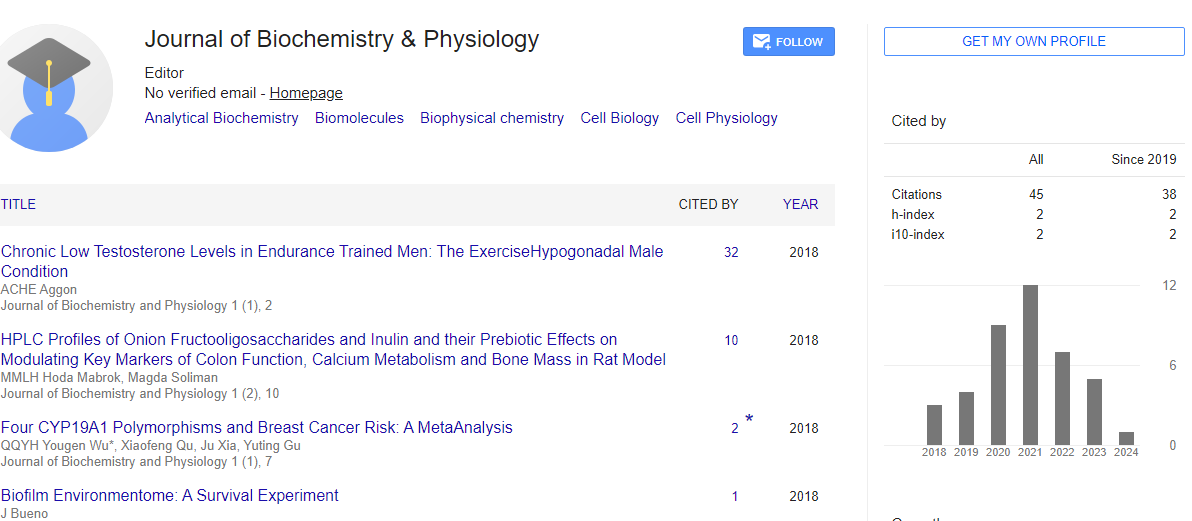Opinion Article, J Biochem Physiol Vol: 7 Issue: 2
Epigenetics: Modifications Beyond the Genetic Code
Chen Cao*
1Department of Molecular Biosciences,University of Texas, Austin, USA
*Corresponding Author: Chen Cao,
Department of Molecular Biosciences,
University of Texas, Austin, USA
E-mail: Cao@chen.edu
Received date: 28 May, 2024, Manuscript No. JBPY-24-139480;
Editor assigned date: 30 May, 2024, PreQC No. JBPY-24-139480 (PQ);
Reviewed date: 13 June, 2024, QC No. JBPY-24-139480;
Revised date: 21 June, 2024, Manuscript No. JBPY-24-139480 (R);
Published date: 28 June, 2024, DOI: 10.4172/jbpy.1000162.
Citation: Cao C (2024) Epigenetics: Modifications Beyond the Genetic Code. J Biochem Physiol 7:2.
Description
In the field of genetics has traditionally focused on the role of DNA in heredity and the expression of traits. However, it has become increasingly clear that the genetic code alone does not account for all biological diversity and disease manifestations. Epigenetics, the study of heritable changes in gene expression that do not involve alterations in the DNA sequence, offers a deeper understanding of how environmental factors, lifestyle, and developmental processes can influence gene activity.
Epigenetic modifications regulate gene expression through several interconnected mechanisms: DNA methylation, histone modification, and non-coding RNAs.
DNA methylation involves the addition of a methyl group to the 5th carbon of cytosine residues in CpG dinucleotides, often leading to gene repression. This modification is typically associated with the silencing of genes and the stabilization of chromatin structure. Methylation patterns are established during development and can be influenced by environmental factors, such as diet and exposure to toxins. Histone modifications involve chemical changes to the histone proteins around which DNA is wrapped, affecting chromatin structure and gene accessibility. These modifications include acetylation, methylation, phosphorylation, and ubiquitination. The addition or removal of these chemical groups can either activate or repress gene expression. Non-coding RNAs (ncRNAs), such as microRNAs (miRNAs) and long non-coding RNAs (lncRNAs), play crucial roles in regulating gene expression post-transcriptionally. They can bind to messenger RNAs (mRNAs) to degrade them or inhibit their translation, influencing the expression of specific genes.
Epigenetic modifications are critical for normal development and cellular differentiation. They enable cells with the same genetic information to develop into various cell types with distinct functions by selectively activating or repressing genes. Abnormal epigenetic changes are commonly associated with cancer. Dysregulation of DNA methylation and histone modifications can lead to the activation of oncogenes and the silencing of tumor suppressor genes. Epigenetic alterations are implicated in various neurological disorders, including autism, schizophrenia, and Alzheimer's disease. These changes can affect brain development, synaptic plasticity, and neuronal function. Epigenetic mechanisms also influence metabolic processes and can contribute to conditions like obesity and diabetes. Environmental factors such as diet and physical activity can lead to epigenetic changes that affect metabolism and energy balance.
Understanding epigenetic mechanisms opens new avenues for therapeutic interventions. Epigenetic therapies aim to reverse abnormal gene expression patterns by targeting the enzymes involved in DNA methylation and histone modifications. Drugs targeting epigenetic modifiers, such as DNA methyltransferase inhibitors (e.g., azacitidine) and histone deacetylase inhibitors (e.g., vorinostat), are being used to treat cancers by reactivating silenced tumor suppressor genes or repressing oncogenes. Advances in gene editing technologies, such as CRISPR/Cas9, are being adapted to specifically target and modify epigenetic marks. These tools offer precision in editing epigenetic states, potentially correcting aberrant epigenetic modifications in diseases.
Conclusion
Epigenetics reveals that the regulation of gene expression extends beyond the DNA sequence, encompassing a complex network of modifications that can be influenced by environmental and developmental factors. These modifications plays an important roles in development, differentiation, and disease. The understanding of epigenetic mechanisms not only enhances our knowledge of cellular regulation but also paves the way for innovative therapeutic approaches. As research in epigenetics continues to advance, it holds promise for developing targeted therapies that address the root causes of diseases by modulating the epigenetic landscape.
 Spanish
Spanish  Chinese
Chinese  Russian
Russian  German
German  French
French  Japanese
Japanese  Portuguese
Portuguese  Hindi
Hindi 